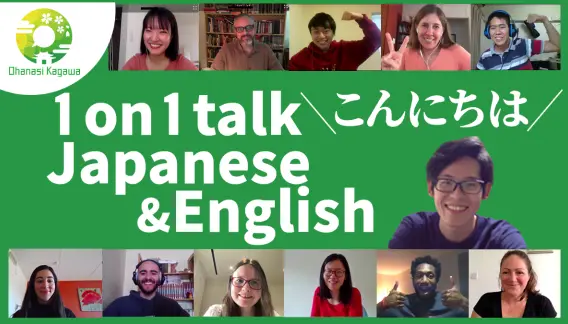
Many people from many countries are looking forward to coming to Japan as they have been waiting for a long time as the restrictions on entry into Japan by the Corona are being eased. However, if you are coming to Japan for the first time, you may be worried about whether or not the Japanese can understand English when you speak to Japanese people in English or whether Japanese people speak English or not. Knowing whether Japanese people speak English before you come to Japan may help make your visit to Japan more enjoyable.
The writer of this article was born in Japan, graduated from high school under the Japanese English education system, and then went on to study psychology at a university in the U.S. using English, which is not my native language. Through my study in the U.S., I learned the reality that the English I had learned in Japan were completely useless, and I wrote this article based on my experience of thinking about and researching why so many Japanese do not speak English.
Only 2.5% of the Japanese population speaks English?

Survey of 1,000 Japanese people by a Japanese company.
Can you imagine how many Japanese speak English?
In 2017, Kodansha Co., Ltd. in Japan surveyed 1,000 Japanese men and women in their 20s to 60s who had never lived overseas or studied abroad and had learned English only through school education in Japan (we call them “Zyunzyapa”). The results revealed the current situation of Japanese people’s English levels and attitudes toward English.
Only 2.5% answered that they can speak and listen to English without problems
Kodansha Co., Ltd. took surveys of Zyunjapa (Japanese people who received their English education only in Japan) and found that surprisingly, only 2.5% of Zyunjapa have the ability to speak and listen to English conversation without problems and only 2.2% of the Japanese people said their speaking ability was at a level that would allow them to do their jobs.
How do you feel about these results? Many Japanese people today study from elementary school through university and Japanese who go on to university have had 16 years of English education in Japan. It is hard to believe that only 2.5% of Japanese can speak and listen to English without any problems. Almost half (43.5%) of the Japanese people said that they can hardly speak at all, and 49.9% said that they can speak at the level of Japanese elementary school students (i.e., they can say a few words they know).
Only 20% of Japanese people answered that they could answer when asked for directions by English speakers
How many of the Japanese people you ask for directions when you actually come to Japan are able to answer in English?
According to a survey of 1,000 Zyunjapa (Japanese who received their English education only in Japan), only 20% of Japanese people could answer in English (21.8%) when asked for directions by English speakers. Therefore, if you ask 10 Japanese people for directions in English, only 2 Japanese people will answer correctly. Many Japanese will be panicked when suddenly spoken to in English.
Why do Japanese not speak English?

So why are so many Japanese who cannot speak English so well? While it is true that there are differences in grammar and pronunciation between Japanese and English, these are often not the only factors. I believe that there are 5 main factors that prevent Japanese people from speaking English.
1: Japanese people have only received English education for entrance examinations.
The first reason is that many Japanese students take English classes in school not to learn to speak English, but to get a high score to pass the high school or university entrance examinations. For this reason, most English classes in Japan focus only on grammar and reading. Speaking classes are rarely given unless you attend a school that specializes in English, such as an international school. In fact, I took English classes in elementary school, junior high school, and high school, but I rarely had a conversation in English during class. I spent most of my time just trying to understand the structure of English sentences. This is why many Japanese students dislike English classes. In fact, according to a survey of 1,000 Zyunjapa (those who studied English only at school in Japan), 62.7% of them “did not enjoy” English classes in junior high school. The reasons for this were that the classes were “boring” and “full of grammar. Recently, the number of ALTs (Assistant Language Teachers) from overseas has been increasing, and teachers are trying to increase opportunities for students to experience real English in Japanese schools, but there is not enough speaking time for Japanese students to speak English if there is only one ALT.
2: Almost zero opportunity to speak English in Japan
The second reason is that there are still few opportunities to speak English in Japan. Especially in rural areas of Japan, there are few foreign tourists or immigrants, so opportunities to interact with non-Japanese people are almost zero. In fact, I lived in a rural area of Japan and was desperately looking for a place where I could speak English before entering a university in the United States. There were few such places, however, and the only opportunities to speak English with people from other countries were to go to an English conversation school or find a place called a “foreigner’s bar. I don’t think it is possible for Japanese people to learn to speak English if there is no place where they can use English even if they learn it.
3: Perfectionistic, afraid to make grammatical mistakes
The third factor is that many Japanese are perfectionists who are afraid of making mistakes in grammar and vocabulary. In fact, I am one of them. When I entered a university in the U.S., I was always afraid that I would make a mistake in my grammar, so I could not speak up even if I wanted to. I believe that one of the main reasons I became afraid of making grammatical and vocabulary mistakes is because of the English education in Japan. Japanese English education is mainly based on a point deduction system. Therefore, no matter how well you understand the meaning, the more minor grammatical and spelling mistakes you make, the more points are deducted, and you cannot receive points unless you make sentences with perfect grammar and words. This “English must be perfect” mentality is what discourages Japanese people from speaking English.
4: Less need to study English in the first place
The 4th factor is the fact that many Japanese people feel less need to study English in the first place. In today’s Japan, economically speaking, there is little need to use English if many Japanese people just work and live in Japan, and few Japanese people have ever been abroad. In fact, when I was a student, I did not feel the need to study English at all. I felt that why should I learn English by going through hardship when I was going to live in Japan anyway? And as long as I stay in Japan, I have few opportunities to speak in English, so I don’t feel the need to study English. After all, I myself did not feel the need to study English until I actually studied at a university in the U.S. and began to use English in business. However, it is a fact that the need for English is increasing in Japan and the world, where globalization is progressing, and I feel that Japanese people need to learn English more and more.
5: Many Japanese are shy and not good at initiating conversation
The last factor is that many Japanese people are shy and are not comfortable talking to others. This is due in part to cultural factors. In Japan, people rarely greet or talk to strangers in a friendly manner. For example, when I lived in the U.S., I often casually said “Hi” to people I walked past, or made casual conversation with them, asking how they were doing. If you were to do that in Japan, you might be thought of as suspicious or strange, and people would be very cautious of you. Having grown up in such an environment, I feel that it is too hard for Japanese people to speak to people abroad in English. When I myself saw a non-Japanese person having trouble on the street, I was too afraid to talk to him even if I could speak English a little. Such cultural and personality factors may be one of the reasons why Japanese people do not speak English.
Phrases for when you meet Japanese who don’t speak English.

If you do not know any Japanese when you come to Japan, it may be difficult to enjoy sightseeing unless you have an interpreter to help you. By knowing at least a few phrases, you may be able to enjoy yourself a little more when you come to Japan for sightseeing, and you may have less trouble when you are in Japan. Try to remember the phrases I am going to introduce now and use them when you come to Japan.
Phrases to use when asking Japanese people who don’t speak English
1. すみません。ひとつおうかがいしたいことがあるのですが
Excuse me, I’d like to ask you one question.
2. すみません。すこしおしえていただきたいことがあるのですが
Excuse me. I would like to ask you to tell me a few things.
3. すみません。すこしいいですか?
Excuse me. May I have a moment?
Phrases telling the destination where you want to go to Japanese people who don’t speak English
1. Name of placeという場所(ばしょ)にいきたいのですが、どうしたらいいですか?
I want to go to a place called Name of place, how should I go?
2. Name of placeという場所(ばしょ)はどこにありますか?
Where is the place called Name of place?
3. Name of place にはこの道(みち)であっていますか?
Is this the right way the Name the place?
Phrases to ask Japanese people who don’t speak English when shopping
1. これを買(か)いたいです。
I would like to buy this.
2. これはいくらですか?
How much is this?
3. Name of product はどこにありますか?
Where is the Name of a product?
Phrases for asking Japanese people who don’t speak English for help
1. すみません。たすけてもらえますか?
Excuse me, could you please help me?
2. すみません。こまっているのですが
Excuse me, I am having a problem now.
3. すみません。てつだってもらえませんか?
Excuse me. Could you help me?
Phrases for expressing gratitude to Japanese people who don’t speak English
1. ありがとうございます!
Thank you very much.
2. たすかりました!
I appreciate your help!
3. 本当(ほんとう)にかんしゃしています。
I really appreciate it.
How do Japanese people feel when they have to speak English?

Finally, I would like to tell you how Japanese people who don’t speak English feel when English speakers talk to them.
By understanding how Japanese people who don’t speak English feel when English speakers talk to them, you may be able to understand how they feel and know how to deal with it.
1- Desperate to answer in English
First of all, Japanese people get nervous when they see a foreigner and feel they have to speak English. Even if you can speak Japanese, the Japanese will be desperate to communicate with you in English. They may try to answer your questions in English using poor English and gestures, so please listen carefully and speak slowly when asking questions in English.
2- They want to tell you they don’t speak English and walk away
Secondly, Japanese people who believe they are not good at speaking English tend to avoid people from foreigners so that they will avoid being spoken to. They may say “No, No, I don’t know” and try to escape when you approach them. This is not because they don’t like you, it is just that many Japanese people are negative mind about their English level. They feel ashamed of not being able to speak English, so they try to avoid or avoid you. Understand that some people avoid or escape from such feelings.
3- Panic because their mind has gone blank
The last pattern is that Japanese people’s heads go completely blank. Such Japanese people who don’t speak English may freeze up and not be able to speak at all. In such cases, you should gently tell them that it is okay. They may be relieved to hear you speak a little Japanese.
How was it? Many Japanese people rarely speak English in their daily life, and it may be difficult to really enjoy sightseeing in Japan unless you can speak a little Japanese when you come to Japan. So, before you come to Japan, improve your Japanese language skills as much as possible so that you can enjoy Japan as much as possible!
Ohanasi Kagawa holds online language exchange events on weekends. Japanese language learners and English language learners are paired together. You then switch between English and Japanese every 15 minutes. This way, both of you can learn a language. Online, you can communicate with Japanese people without having to go to Japan. The rules are designed to ensure that you can participate safely. So, even if you are new to online events, please check them out. This is the perfect event for those who want to spend a little time in Japanese while maintaining their current lifestyle.
That said, you might still not be confident in your Japanese speaking ability. You’re not sure how to study Japanese. For people like that, we are currently offering free Japanese language consultation and free lessons for a limited number of 10 people each month.
You don’t know how to study Japanese. If you are interested in taking Japanese lessons to solve what you don’t understand, please feel free to join us.
If you are interested, please click the URL or image below.
Click here to see more details >>>







